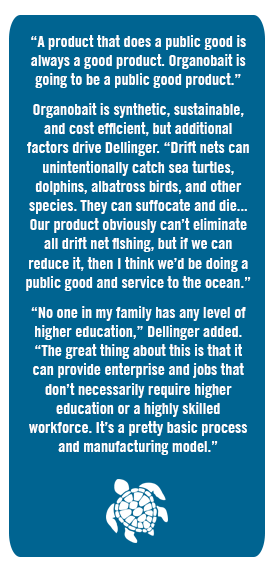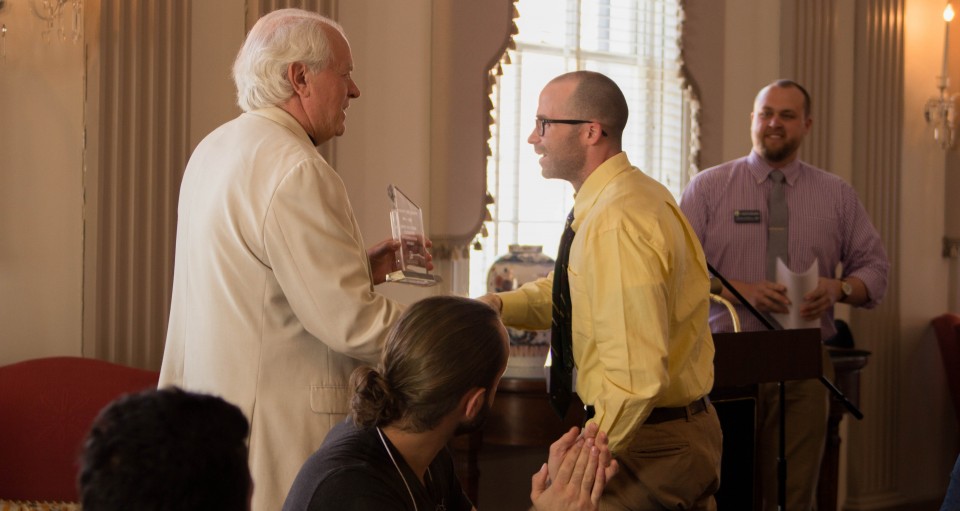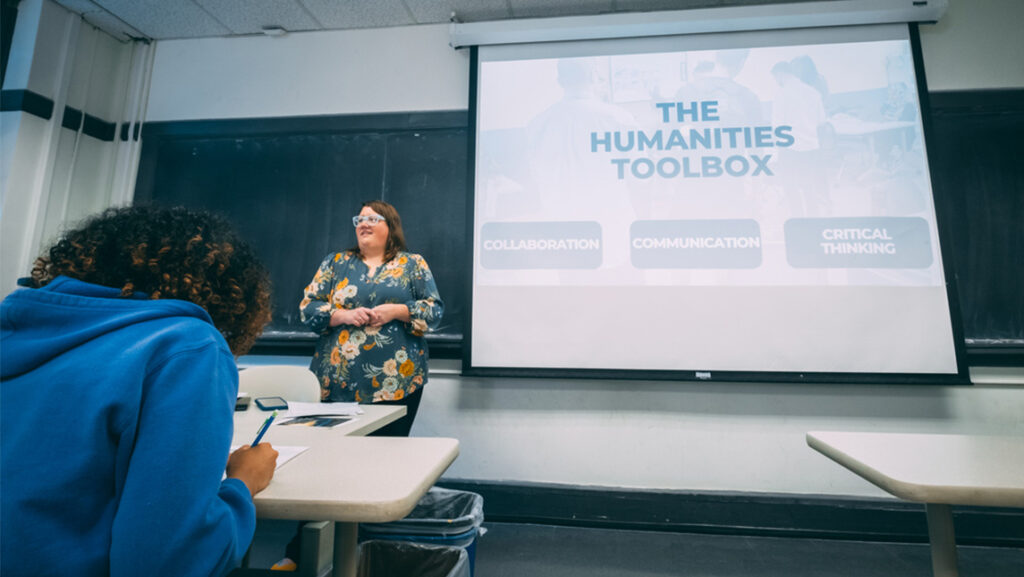Former Associate Vice Chancellor for Economic Development Jerry McGuire retired last year after working in technology commercialization for over 30 years. On March 31, 2015, the first annual Jerry McGuire Student Entrepreneur Award was presented to UNCG doctoral student Anthony Dellinger.
The $1,000 award goes to a student or team that has displayed superb entrepreneurial achievement. Dellinger, who is pursuing a PhD in nanoscience, won for his patent-pending Organobait. The product is a synthetic bait for crustaceans that could revolutionize a struggling industry.
Currently, crustacean fishermen catch, kill, and freeze bait fish from the ocean. Shortly after, the fish are thawed and lowered back underwater to decay and release byproducts, which attract crabs and lobsters. The concept sounds harmless, but crustacean fishermen are using significant amounts of bait fish every year.
 “The issue doesn’t seem very impactful until you start digging into it,” says Dellinger. “Tuna, marlins, and other big fish eat bait fish as their primary food source. Polar bears eat bait fish. The fish are critical to the ecosystem and overall health of the ocean, so the more we’re removing, the more it’s starting to affect other areas.”
“The issue doesn’t seem very impactful until you start digging into it,” says Dellinger. “Tuna, marlins, and other big fish eat bait fish as their primary food source. Polar bears eat bait fish. The fish are critical to the ecosystem and overall health of the ocean, so the more we’re removing, the more it’s starting to affect other areas.”
“We looked at the bait industry and we knew there had to be a better way to do it. There had to be a more synthetic version of this that could still bring crabs and lobsters to the fishermen.” Dellinger and his colleagues examined common bait fish and started configuring equivalent organic forms. Thus, Organobait was born.
Organobait is better for the environment, but what motivates crustacean fishermen to switch? “Availability,” says Dellinger. Fish oil supplement and cat food companies also target bait fish, making them an increasingly scarce commodity. Fishermen are struggling with the diminishing numbers.
“We had a game-changer: give them something that was always available and would pique their interest.” A product that does not require refrigeration or storage in a cool environment is sure to catch fishermen’s attention. “They don’t need large, walk-in freezers or other big energy costs with our bait. They also don’t have to worry about shelf life.”
Dellinger developed Organobait with the help of a $50,000 grant from the NC Board of Science, Technology, and Innovation, along with two separate grants from the National Science Foundation worth $25,000 and $150,000. In his final year as a JSNN student, Dellinger used his innovation to create a spin off company, Kepley Biosystems. The company is named for his advisor, UNCG associate professor Chris Kepley.
Upon winning the Jerry McGuire Student Entrepreneur Award, Dellinger was immediately contacted by North Carolina’s Small Business and Technology Development Center. “As scientists, understanding the business side can be a daunting task. Getting in touch with them has been a real positive.”
 See more photos of the event at https://www.flickr.com/photos/uncgresearch/sets/72157652131873231/.
See more photos of the event at https://www.flickr.com/photos/uncgresearch/sets/72157652131873231/.
Award runners-up were Naomi Thomas and Holly Riley. The UNCG undergraduates were nominated, respectively, for developing the “IT is for Girls” IT Camp and the Music Discovery Program. Check back with UNCG Research soon to read their stories!
 Article author Kevin Flanagan is a Media and Communication Intern with the UNCG Office of Research and Economic Development. He explores and writes articles about the on and off campus impacts of UNCG research. Kevin is a senior at UNCG, majoring in Communication Studies and minoring in Media Studies. His interest in business, marketing, communication, and media led him to his current position.
Article author Kevin Flanagan is a Media and Communication Intern with the UNCG Office of Research and Economic Development. He explores and writes articles about the on and off campus impacts of UNCG research. Kevin is a senior at UNCG, majoring in Communication Studies and minoring in Media Studies. His interest in business, marketing, communication, and media led him to his current position.



